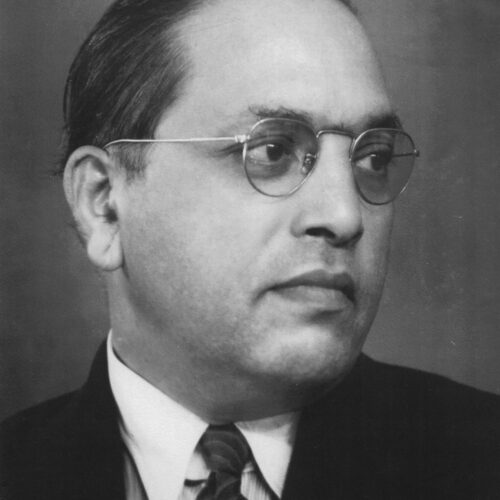

You must abolish your oppression yourselves. Do not depend for its abolition upon God or superman. Your salvation lies in political power and not in making pilgrimages and observance of fasts.
B. R. Ambedkar, quoted by Vidya Anand in a lecture to the South Place Ethical Society, 24 March 2002
Bhimrao Ramji Ambedkar was an Indian jurist, economist, social reformer, and politician who played a key role in drafting India’s Constitution. A lifelong activist against the caste system, for most of his career Ambedkar was also a declared atheist and rationalist, placing the responsibility for social change firmly in the hands of human beings.
Bhimrao Ramji Ambedkar was born into the Dalit (formerly ‘untouchable’) community in Mhow, Madhya Pradesh. Though subject to segregation and caste discrimination, Ambedkar entered Bombay’s Elphinstone High School, and subsequently Elphinstone College, going on to earn doctorates from both Columbia University, New York and the London School of Economics, as well as being called to the Bar.
Ambedkar became a tireless advocate for the rights of Dalits, women, and workers, and was vocal in his opposition to the use of religious texts and teachings to justify inequalities – from caste discrimination to the mistreatment of women. In 1930, he attended a conference on Indian constitutional reform in London as a representative of the ‘untouchable’ classes, and became involved in the negotiations which led to the 1932 Poona Pact, giving electoral representation to the ‘untouchable’ castes.
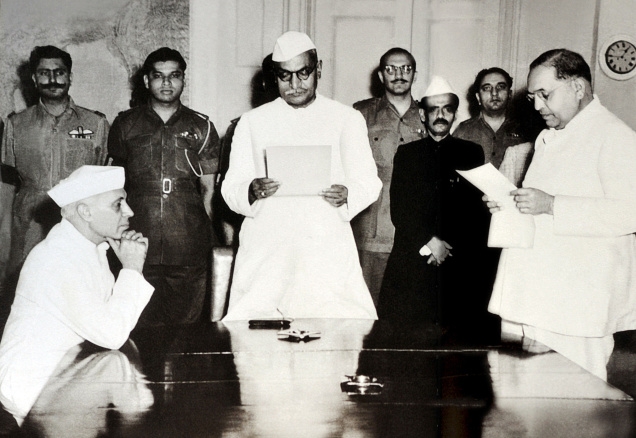
Following the independence of India, Ambedkar was invited by Jawaharlal Nehru to serve as Law Minister. Soon after, he was appointed chairman of the Drafting Committee of the Constitution, becoming its chief architect. In this role, Ambedkar ensured provisions for social justice and equality. He fought against caste oppression and promoted education and economic empowerment for marginalised communities.
Throughout his life, Ambedkar founded a number of organisations for the education and uplift of the socially disadvantaged. These ranged from early efforts to challenge the caste system (such as through the Society for the Welfare of the Depressed Classes), through the creation of the People’s Education Society, to the formation of the All-India Scheduled Castes Federation (later the Republican Party of India).
Shortly before his death in 1956, Ambedkar converted to Buddhism, inspiring millions of Dalits to follow him. Writing for New Humanist in 2007, writer and rationalist Sanal Edamaruku discussed this legacy:
Ambedkar was a declared atheist and rationalist. His decision to take “diksha” and be reborn a Buddhist was made just two months before his death. It was an unfortunate, even disastrous end to a significant career.
Despite his latter, and highly publicised, conversion to Buddhism, Ambedkar’s life was one firmly rooted in humanist ideals of education, equality, and self-determination. His legacy continues to influence social justice movements in India, and in 1990 he was posthumously awarded the Bharat Ratna, India’s highest civilian honour. In 2002, lecturing before the South Place Ethical Society, Vidya Anand described Ambedkar as a:
socialist and philosopher, the framer of independent India’s enlightened constitution, that is sadly honoured largely in its breach, and the founder of the modern Dalit liberation movement. It was [he] who taught that the Dalit People would have to be their own liberators, that no saviour or superman from on high would deliver. There was none so fit to break the chains as those who wore them.
Vidya Anand, Lecture to the South Place Ethical Society, 24 March 2002
Bhimrao Ramji Ambedkar | Oxford Dictionary of National Biography
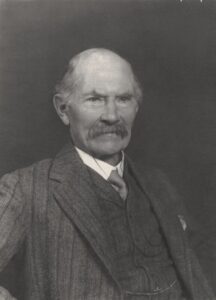
Throughout his life, Professor of Philosophy, John Muirhead, sought to put his ethical principles into practice. Indeed, whilst philosophers are […]
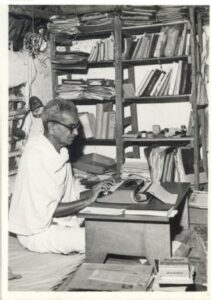
Godlessness is negative. It merely denies the existence of god. Atheism is positive. It asserts the condition that results from […]
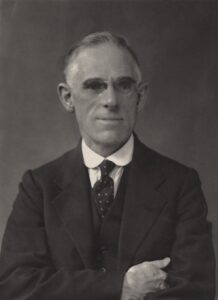
Harry Snell was a socialist politician and campaigner, a devoted advocate of the Ethical Movement and a key figure in […]

As well as being one of the most distinguished musicians of his time, he was, like Sir Hubert Parry before […]